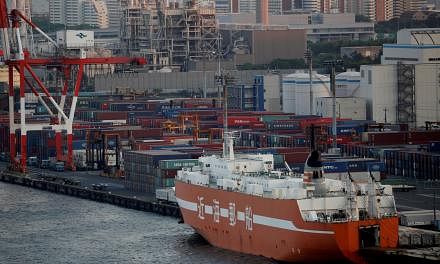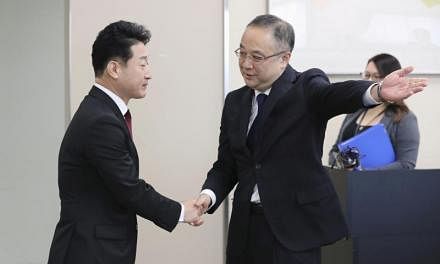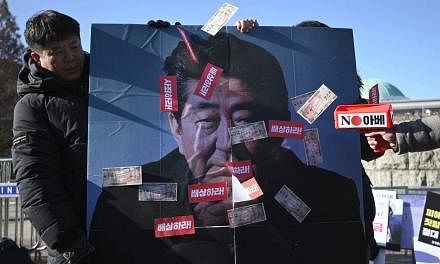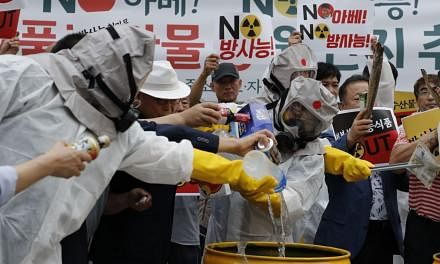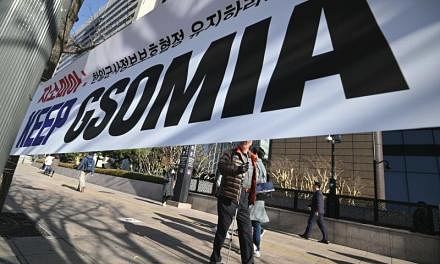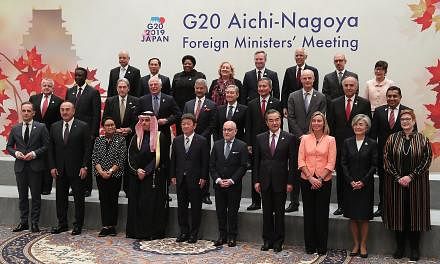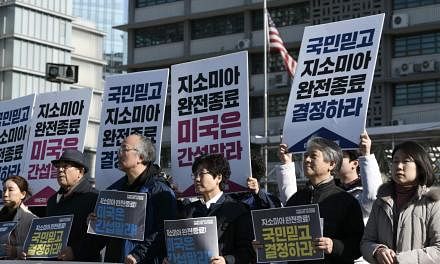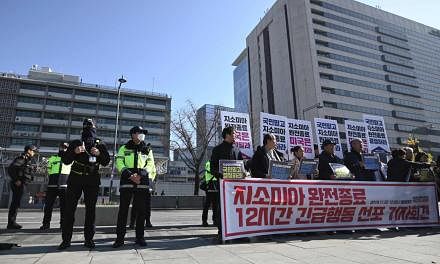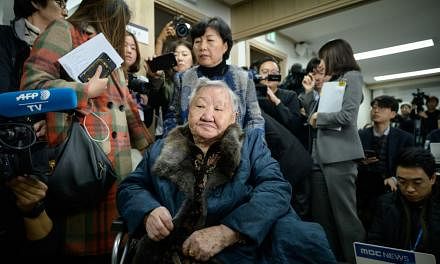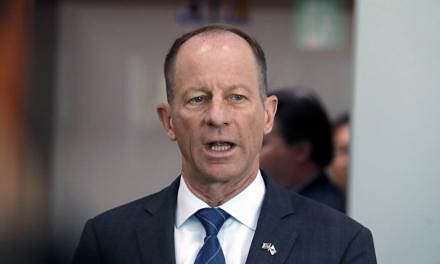TOKYO - Japan and South Korea are once again at loggerheads, this time accusing each other of "distorting truths" in their conflicting accounts of what had transpired behind Seoul's decision last week to save a bilateral military intelligence pact from the brink and to agree to trade dialogue.
On Friday (Nov 22), Seoul announced an about-turn on its August decision to pull out from the General Security of Military Information Agreement (GSOMIA) - just hours before the deal would have lapsed.
South Korea's threat to scrap the intel-sharing pact came after Japan struck it off its white-list of "trusted" trade partners in August, following tightened export regulations on sensitive materials the month before.
This latest war of words - Seoul said the media was "creating a truth game" while Tokyo's said it was "unproductive" to respond to each and every allegation - comes as officials denounced and denied comments made by the other side.
The bone of contention now is whether Tokyo has apologised over what Seoul has said was a wilful misrepresentation of events.
South Korea's senior press secretary Yoon Do-han, taking issue with a source-based report in Japan's Yomiuri Shimbun, said: "To clarify once again, we have complained and Japan apologised. Japanese and Korean media are creating a truth game, but we know the truth."
This prompted Japan's top government spokesman Yoshihide Suga to tell a regular news conference: "It is not productive to comment on every remark by South Korea, but it is not true that the Japanese government apologised."
On Sunday (Nov 24), South Korea's top national security adviser Chung Eui-yong said that he felt "deep regret" that Japan had deliberately manipulated details of their trade negotiations leading up to the decision to "conditionally" maintain GSOMIA.
"It was not only very different from what the two sides agreed on, but if this is what had been discussed, there's no way there would have been an agreement," he said.
This prompted a near-immediate rebuttal by Japan's Ministry of Economy, Trade and Industry (Meti), which said on Twitter that its announcement was aligned with what has been agreed in prior discussions.
South Korea's decision to keep GSOMIA was announced at 6pm last Friday (5pm in Singapore) in a carefully-orchestrated news conference, although Japanese media broke the news an hour earlier in what Mr Chung called an "intentional leak".
Almost concurrently, Meti called a news conference announcing that both countries will resume dialogue over its imposition of tighter export regulations to South Korea due to concerns of mishandling of sensitive material.
It said that Seoul had "shown willingness to make improvements regarding problems with the current state of export controls", although Tokyo will not immediately restore South Korea's status on its white-list of trusted trade partners.
Mr Chung, who said this was "factually incorrect", contended that South Korea has strong export controls in place and that he agreed to discuss Japan's removal of the tightened controls.
Japan had said it had no choice but to strike South Korea off the white-list given that Seoul has refused to convene high-level talks since 2016 despite its repeated attempts to raise its concerns. Seoul, which sees no basis in Japan's complaints, says they are politically-charged.
Separately, Japanese Prime Minister Shinzo Abe had described South Korea's U-turn on GSOMIA as a "strategic decision", adding privately that Tokyo had made "zero concessions" amid the mounting US pressure on Seoul.
Japan insists that defence and trade are completely unrelated issues, even as South Korea argues otherwise.
US Defence Secretary Mark Esper had, on a visit to Asia last week, stressed that allowing GSOMIA to lapse will only play into the hands of a nuclear-armed North Korea and an assertive China. Without the pact, Tokyo and Seoul would only have been able to share information via Washington as an intermediary.
The fresh barbs may complicate attempts to confirm a leaders' summit between Mr Abe and South Korean President Moon Jae-in next month in Chengdu, on the sidelines of a trilateral summit also involving Chinese Premier Li Keqiang.
Mr Abe and Mr Moon have not had formal talks for more than a year, although they had an 11-minute chat through interpreters in Bangkok this month on the sidelines of Asean Summit meetings.


